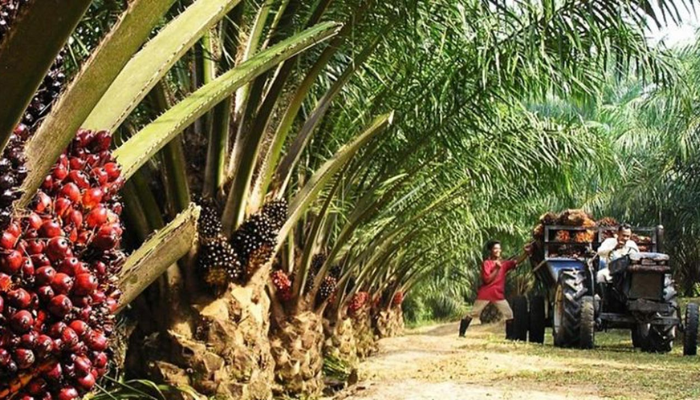Nigeria’s Oil Palm Growers to replant 1.5m hectares in industry revamp plan

The Oil Palm Growers Association of Nigeria (OPGAN) plans to revamp the industry by replanting 1.5 million hectares of land over the next 5 years across the 27 major oil palm producing States in Nigeria.
This is contained in the Oil Palm Development Strategy for Nigeria 2024 – 2029 which OPGAN developed to propel Nigeria’s oil palm industry from its current 5th position to the 3rd rank in global palm oil output.
The plan will also revitalize and elevate Nigeria’s oil palm industry, positioning it as a global 3rd leader through proper planning, investments, sustainable practices, innovative technologies and inclusive growth strategies
The 5-year Oil Palm Development Strategy for Nigeria is the frst time in Nigeria that a commodity organisation is formulating a comprehensive strategic plan tailored to its subsector’s unique needs and aspirations, Joe Onyiuke, president, Oil Palm Growers Association of Nigeria told BusinessDay in Abuja.
He said, “In the annals of Nigeria’s agricultural landscape, the oil palm industry stands as a cornerstone of economic prosperity and agricultural advancement. Yet, amidst its significant contributions, there exists a palpable gap in the strategic framework for its sustainable development”.
“As the Oil Palm Growers Association, we have embarked on a journey to bridge this gap and propel our industry into a new era of growth and resilience. This document represents more than just a strategy; it embodies a paradigm shift, a game-changing blueprint meticulously crafted to address the shortcomings of the past, set ambitious yet achievable targets, and chart a course towards a vibrant and sustainable oil palm sector,” he added.
Onyiuke further noted that the Oil Palm Development Strategy for Nigeria 2024 – 2029 “delineates the challenges that have impeded our progress, from inefficient land use practices to market volatility, and presents actionable recommendations and modalities to surmount them.
“But our vision as an organization cannot materialise in isolation. We call upon all stakeholders—government agencies, private enterprises, research institutions, and local communities—to embrace this strategy fervently. It is not merely in the
interest of Nigeria as a nation, but in the enlightened self-interest of each stakeholder. Together, let us sow the seeds of prosperity, cultivate innovation, and harvest the fruits of a revitalised oil palm industry for the betterment of our nation
and our future generations,” he noted.
The oil palm industry occupies a very strategic position in global food markets and economies, as its derivative products and universal use in various aspects of human life.
The sustainably increasing market for the industry, job creation and poverty alleviation potentials amongst others, underscores the interest of various countries in supporting its orderly growth and development.
Historically Nigeria was a lead exporter of crude palm oil in the 1960s. It is currently the largest consumer of palm oil in Africa (World bank, 2018). While it consumed 3 million MT of fats and oil in 2018, its output of fats and oils stood at 1.02 million MT and this translated to a gap of 1.92 million MT.
The total palm oil output gap to bring Nigeria to 3 position in global production would be about 4 million MT that is to surpass Thailand’s 2.7 million MT and this will require that Nigeria produces 3.38 million MT additional palm oil. At 3.5 MT per hectare, Nigeria will need to cultivate about additional 965,714.30 hectares by 2029.
Also speaking on the Oil Palm Development Strategy for Nigeria 2024 – 2029, Abdullahi G. Abubakar, Director, Federal Department of Agriculture Federal Ministry of Agriculture and Rural Development said, “The Federal Ministry of Agriculture and Food Security views this initiative with utmost accolades and satisfaction. I salute the dogged efforts by the Oil Palm Growers Association in crafting this roadmap that not only addresses the challenges facing the oil palm industry but also aligns seamlessly with the overarching objectives of the Federal Government to bolster the agricultural sector and attain food security objectives.”
He said, “This document serves as a testament to the collaborative spirit and commitment to excellence within Nigeria’s agricultural community through those who are practitioners themselves. It is a testament to what can be achieved when
stakeholders join forces in pursuit of a common goal. As such, I urge other agricultural commodity associations to emulate the commendable efforts of the Oil Palm Growers Association and take proactive steps towards developing similarly robust and implementable strategic plans for their respective subsectors”.
Abubakar said the successful implementation of the 5-year Oil Palm Development Strategy will no doubt, hinge on the dedication of the stakeholders within the oil palm industry and also on the support and collaboration of government agencies, financial institutions, development partners, and other relevant stakeholders.
“I implore all parties to rally behind this initiative and provide the necessary resources, expertise, and support to ensure its resolute implementation. Together, let us seize the economic opportunities outlined in this document and propel Nigeria’s oil palm industry to unprecedented heights of prosperity and sustainability,” he added.
This oil palm development program is an initiative of the Oil Palm Growers Association of Nigeria (OPGAN) to reach that goal of Nigeria occupying 3 position in global palm oil space within the period 2025 to 2029.
The need for this strategy arises from absence of a comprehensive blue print in that regards, necessity of target-based approach to reverse unfavourable output trend, prevalence of uncoordinated and conflicting efforts, necessity of optimizing the sector potentials and create a benchmark for measuring future progress.

